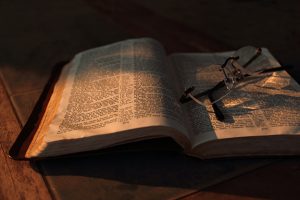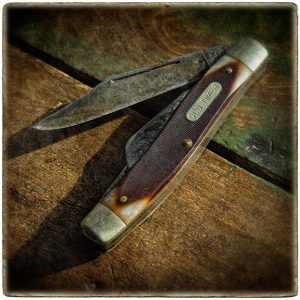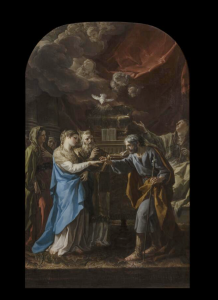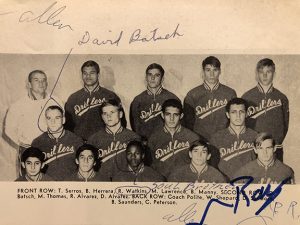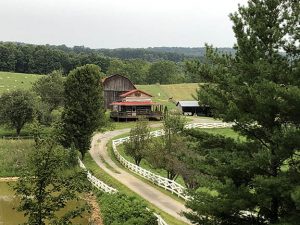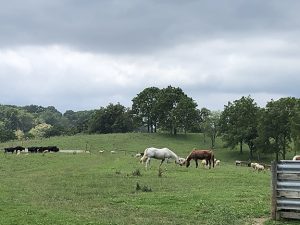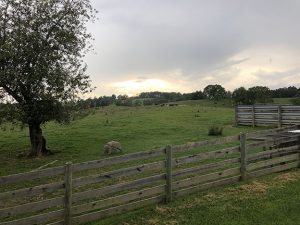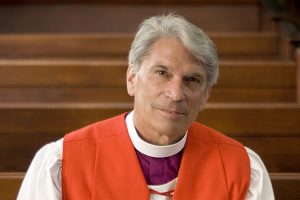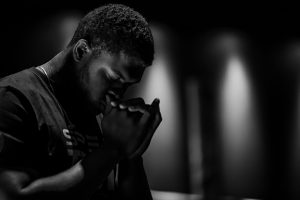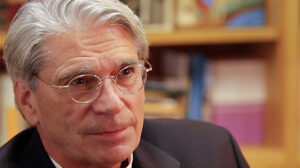 On January 6, 2022, I (Joy Hunter) had the opportunity to sit down with Bishop Lawrence to talk about his ministry within the diocese over the last 14 years. The following is a condensed version of our conversation.
On January 6, 2022, I (Joy Hunter) had the opportunity to sit down with Bishop Lawrence to talk about his ministry within the diocese over the last 14 years. The following is a condensed version of our conversation.
How has being bishop differed from what you thought it would be coming in? What surprised you?
In a nutshell, I would say the breadth of the office. Because of the realities on the ground in the Episcopal Church; what was going on in the Anglican Communion in 2008 when I stepped in; and the questions within the diocese about the future, with individual parishes, priests and laity wondering whether we should stay or not, it became an international as well as national and local ministry. While I might have preferred being primarily a pastor to the pastors, a bishop of unity with my own commitments, vision, and purposes, it became a more expansive field of function.
Also, my ministry was influenced by the patterns of my predecessors. Bishop Allison was a scholar/theologian and Bishop Salmon was what I call the quintessential executive administrator leader. I came with a very different set of gifts. Bishop Salmon’s way of operating was deeply entrenched, and that wake was strong. It took me a while before I could navigate in a world that did not include that wake.
So, knowing that, what advice would you give to someone who’s stepping into the role of bishop? and not just in this diocese, but in any diocese?
The first thing needed is a very high energy level, regardless of anything else. That’s not necessarily asking what kind of gift set the person needs, but they need that.
There’s also a need for a vision, the need for working with emotional intelligence, and for recognizing that the world you step into as a bishop is a very different world than that of a parish priest. The leadership styles that work well in one office do not necessarily work well in another, but at the same time, you’ve got to bring your own style. So, your predecessor may have been a benevolent dictator, and you may be a more collegial leader.
I do not think a bishop needs to be a great preacher, or maybe even a really strong preacher, but I think he does need to be a pastor and teacher of the faith. He needs to be able to teach the faith to clergy and to the rank and file members of the diocese. That’s probably more important than being a riveting preacher on Sunday morning.
And then, of course, he needs to have a servant’s heart. Otherwise, he will grow weary in well-doing.
What gives you the most satisfaction, when you look back at your accomplishments over the last 14 years?
I would say to have held the diocese together through the break with the Episcopal Church, while keeping two thirds or more of the diocese with us, was certainly something that is gratifying — to have some 50 plus congregations remain with the diocese, and most of the substantial congregations as well as many smaller congregations across socioeconomic and racial frontiers. It gives me a sense of accomplishment because I know how difficult that was, how many different places people found themselves in, and how dependent upon the role of the bishop as well as the role of the clergy of those individual congregations.
You can divide the last 14 years into chapters.
There was 2008 to the fall of 2012, roughly five years. During that season we were a resistance movement within the Episcopal Church even while we were a forthright diocese, helping to shape emerging Anglicanism in the 21st century, “Making Biblical Anglicans for a Global Age.”
That was the vision I put forward in 2009 as a way of saying, “Look, the foremost question before us isn’t whether we leave the Episcopal Church or stay in the Episcopal Church. The foremost question is, “What is our vision?” What are we about? What are we going to be? What do we see? What has God called us to do?
I put forward a vision in a paragraph. But then I cut it down to T-shirt size, “Making Biblical Anglicans for a Global Age.” And underneath that, “Helping to shape emerging Anglicanism in the 21st Century.” During those first five years, we did that within the Episcopal Church.
When we left the Episcopal Church in the fall of 2012, we went into a world where we were not a resistance movement within a province, but a diocese without a province, one in the midst of legal maneuvers that were seeking in many ways to thwart, defeat and destroy us. At the same time, we were still committed to the larger Anglican world.
Between 2013 and 2014, we soldiered on until the primates of the Global South granted us, in 2014, Alternative Primatial Oversight. From 2014 on, we were under the primates (the Archbishops) of the Global South.
Then in 2017, a new chapter began when we voted at our diocesan convention to join the ACNA. And so at that time we shifted from a resistance movement to a complimentary companionship relationship. We were again a diocese in a province.
Of course, later in that same year, 2017, we got a very confusing ruling from the South Carolina Supreme Court. We had previously been in an environment in which we had a very clear, positive ruling for us in our legal standing and our ownership of property and buildings. And suddenly we were put into limbo with a very threatening adversary who was trying to move our people back into the Episcopal Church. At that time, my role as bishop was to hold the various congregations together.
I put forward a vision for the Anglican Leadership Institute at the 2014 Diocesan Convention and it became a reality in 2015 when I appointed Peter Moore to be the director. It was one dimension of making biblical Anglicans for a global age. We were able to bring emerging leaders from all over the Anglican world, either to South Carolina or Martha’s Vineyard twice a year for three weeks of study to help shape emerging Anglicanism. We did that until COVID struck. Hopefully, we will be meeting on a regular basis again soon.
What are the things I am most grateful for or for which I have a sense of accomplishment? Certainly our role in the larger Anglican world, creating relationships throughout the Anglican Communion. Our involvement in New Wineskins, the number of bishops we’ve helped bring to New Wineskins and, consequently, to the diocese for various visitations. It’s really quite remarkable, from places as diverse as Ireland to Southeast Asia, to Egypt to Nigeria, India to Kenya, Uganda to the Indian Ocean, so many different places.
What will be your fondest memories from this time?
I don’t know. But, going around the diocese on my last trip around the ecclesiastical track, I look out on the congregations and see people I’ve known and worked with over the years. You just realize how sweet many of the relationships are. It was my goal to visit every congregation every year, and for the most part, I’ve done that. Over those 14 years relationships have been built up and trust has emerged.
Along with that, I’ve been with many of them through rector searches, vicar searches, vestry meetings, parish retreats. I’ve ordained more than a few of their priests and deacons, and instituted many of the rectors in their congregations. I’ve led Men’s Conferences, Anglican Women’s Conferences, joined in many Cursillo closings…
Recently I’ve had some epiphany moments. I was putting the books up in my new study at home. And, of course, the study I created doesn’t have enough space to hold all the books. As I’m sorting through the ones I put up and ones I don’t, I’m thinking, “Wow, everything’s changing.” I’m looking at things and saying, “Do I really need that? Am I ever going to need those books on how to lead vestry retreats? Church growth books? Pastoral Care? Is that going to be a part of my life from moving forward? Maybe not? What’s the role of preaching now as opposed to what it has been in the past?” It made me realize, “Wow, I’m stepping into a whole new chapter.”
And I’m going to need a few months to decide on a lot of different things.
What are your immediate plans?
Of course, we’ve bought a house in Florence, SC and moved there. I’ll be finishing my time as bishop the end of March, and taking three months Sabbath—April through June. Allison and I will probably do some traveling. Then, starting in July, I’ll be the interim director of the Anglican Leadership Institute. So, that will define a certain amount of things moving forward, at least for the foreseeable
future.
Do you have any fun things planned?
Well, I’m always going to do hikes and backpacking – that sort of thing. I’d like to take the kayak and the canoe out up there in the Pee Dee. I’ve been on the Lynches River and on a small part of the Black River, but there’s a lot of it I haven’t been on. I’ve never been on the Great Pee Dee or the Little Pee Dee, so that might be nice.
As bishop, how did you keep up your strength? What spiritual, physical, mental exercises are you committed to?
Sustained morning prayer is a high priority. Rarely do I schedule anything that will interrupt it if at all possible. Morning prayer, intercession, and Bible study time. I usually work through a commentary on a book of the Bible almost all the time.
Do you mind me asking how long you spend on that?
I like it when I have two hours. I can’t always fit that in, but I try to get in at least an hour and a half, time for meditation, reflection, listening.
And of course, I have a regular exercise routine. I jog, walk, lift weights. Recently I’ve taken up the stationary bike and the elliptical, because I hurt my Achilles tendon, but it’s not my preference. I prefer to run.
When do you feel closest to the Holy Spirit?
I don’t know if I can answer that. There are times confirming people I have sensed the Holy Spirit’s presence guiding me, and at times in prayer, but I want to caution against an over commitment to having to feel it as opposed to know it. It’s not emotional. I will say this. It’s usually not disconnected from the word of God or ministry with people, which means it’s not primarily about me.
There are times when you’re preaching that I can sense the presence of the Spirit of God. There are times when I’m confirming someone or ordaining someone that I feel the presence of God. There are times I’m doing Bible study, and I sense God speaking to me through his Word. There are times in listening prayer I will sense something, but that’s usually not as firm as those other examples.
And that’s a change. As a parish priest and as a Christian living my life before the episcopacy I sensed God spoke in that way to me more than he has during this season.
I’ve had to walk more by faith less by sight, even Spirit-given sight.
Has it been lonely?
Yes. There have been a lot of lonely times, but that’s true in ministry in general. There was a wonderful sermon preached by F. W. Robertson entitled “The Loneliness of Christ.” It’s very clear to anyone reading the sermon that while he does not reference himself, he had walked that path. It’s not just bishops that walk that path.
I knew that path as a parish priest. Has it been more pronounced at times as a bishop? Yes, I would say that’s true, but that’s not to imply that you’re out there all alone. I’ve had a great team around me. I had a council of advice that I put together of diverse people. I had the deans, and I had the Standing Committee.
Ultimately, you have to make the decisions that are lonely to make, but you have to make them. When there’s conflict in the congregation the bishop then takes off the robe of the bishop and puts on the robe of a judge. You have to make a judgment and you’re the one who has to make it. Nobody else will make it for you. But people in all walks of life have that kind of stuff.
Do you have any final thoughts on the state of the Church? State of the diocese?
I would say that if we prevail, if the parishes prevail in this lawsuit, I think there will be an explosiveness of energy that we’re capable of experiencing. I think it can unleash a great season of missional and ministry ventures that has been put on hold. And along with that, we’ve been on hold because of COVID so most people don’t know where they will be on the far side of that.
If you had one book, not the Bible, you think every person, laity and clergy read, what would it be?
One book? I’m not sure I think in those terms. But if I could only have three books for the rest of my life in addition to the Bible, I’d say a good Introduction to the Old Testament, an Introduction to the New Testament and The Complete Works of William Shakespeare. I would hope everyone could read The Confessions of St. Augustine before they die, but I’m not going to say that I want everyone to read that.
What’s the hardest thing about being the bishop?
For me, the hardest thing about being a bishop is not being rooted in a congregation.
You see, there are different styles of teaching and preaching. The kind of teaching I like best is expository teaching through the Bible or a book of the Bible, teaching a sequential class in a congregation on theology, basic Christian theology, or teaching a class on the history of the Church in England or history of the Anglican Church.
Once I became a bishop the thing that I loved as a parish priest was suddenly gone. And I’m now in a different role as a teacher. Now I come in as a pinch hitter. They want a home run. And they want me, along with the confirmation service, sometimes to fit into the theme they’re working through, which means you can’t develop a theme as much as you’d like.
I was a parish priest for a long time, almost 30 years, before I became bishop. I miss marrying and burying, seeing generations you’ve lived with for years come up to the Communion rail. I miss what Eugene Peterson called the rhythms of grace that keep your life ordered. It’s probably why I make such a strong commitment to that morning prayer, Bible study time. I’m not just quickly going through the morning office. That at least brings some rhythm to life. You’ve got to have it. And the bishop schedule is helter skelter.
The rhythm of the Church year was something that was very dear to me. And there’s a little bit of that now, but it’s not like it was.
Is there such thing as an average day or an average week?
That is the other thing I would say that’s challenging in the role, for me anyway, is that there is not that rhythm of the week that I had in Parish Ministry. I was thinking about that yesterday because today’s the feast of the Epiphany and I don’t like the thought of not having a Eucharist on the Feast of the Epiphany. I thought, you know, if I had it to do over again, I might make a Chapel here in the diocesan office. There’s no reason why we couldn’t have weekly Eucharist for those who wanted to partake in a short, weekly Eucharist. I miss that rhythm of a rector’s Bible study. That rhythm of mid-week Eucharist.
What do you wish the laity knew about being a bishop?
I’m not sure they need to know anything about it. There are some bishops who side automatically with the priests on every issue. And many priests, no doubt, see the role of the bishop as their protector and their backer. That’s not entirely how I see it. Neither is it to believe every negative thing a lay person may say about their priest. So, I want to honor and respect each. But I saw my role as ministering to both clergy and laity as best I could, and doing it fairly and supportively.
What do you wish the clergy knew?
I wish the clergy knew the same thing. I want to be as supportive of them as I can if there’s a conflict. But I also recognize I’m the bishop of the laity as well. The bishop connects the local Church to the diocese, the diocese to the province, and plays a role within the province and the larger community. He is to be the symbol of unity in all of that. And that’s a difficult role to be in, a father wants to see all the children get along.
Do you have favorite Parish?
No, I don’t have favorite parish, but I do have favorite pulpits. There are pulpits I like and pulpits I don’t; pulpits that are great to preach in and others that, for me, just don’t work.
Here’s a pet peeve. You’d be surprised at how many churches have all kinds of lights shining on the altar while the lectern is left in the darkness; the pulpit in the shadows. As if to say, the only important thing happening here is at the altar. That ought not to be the case. The word of God is read. There should be a light that shines on the lectern that gives it a profile. The Word is proclaimed. There ought to be a light that shines on the pulpit that accentuates that something important is going to happen there.
Many of the churches, especially those built during the 50s and 60s, but others as well, when there was no longer an emphasis on the preaching of the word, so there was a trend to downplay the importance of preaching. Consequently, the preacher is too often preaching in the shadows to a world that is very visual in its perceptions. That is an unfortunate combination.
What’s the most helpful thing someone can do for their bishop?
Pray. I would say that was a failure on my part. I should have had a more developed intercessory prayer team. I know there are people that intercede for me, for which I’m grateful, but I haven’t created a well-developed intercessory team that I sent concerns to regularly.
That would be another thing I wish I had done differently. So, two things: I would have put a chapel in the Diocesan House, where we could do Communion. I think that was something that could have been a real blessing, and I would have had an intercessory prayer team.
Do you have any parting words for the diocese?
I do, but I’m saving that for my convention address. You’ll have to wait to hear them then!
Was there anything I didn’t ask; you wish I had?
Well, if you’d asked what it was like when I first came, I’d have quoted Paul in 1 Corinthians where he talks about coming among them in weakness and fear and much trembling. It’s not that Paul is afraid of them, it’s the trembling anxiety to perform a duty well. I would say that’s how I came to this diocese with the trembling anxiety to perform a duty. That has been my goal and it has remained with me the whole time.



